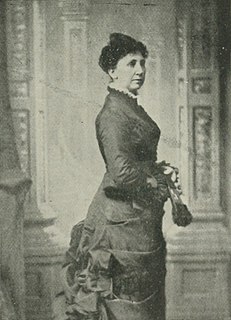A Quote by Nathaniel Hawthorne
What a sweet reverence is that when a young man deems his mistress a little more than mortal and almost chides himself for longing to bring her close to his heart.
Related Quotes
Mortal beauty often makes me ache, and mortal grandeur can fill me with that longing...but Paris, Paris drew me close to her heart, so I forgot myself entirely. Forgot the damned and questing preternatural thing that doted on mortal skin and mortal clothing. Paris overwhelmed, and lightened and rewarded more richly than any promise.
Always man needs woman for his friend. He needs her clearer vision, her subtler insight, her softer thought, her winged soul, her pure and tender heart. Always woman needs man to be her friend. She needs the vigor of his purpose, the ardor of his will, his calmer judgment, his braver force of action, his reverence and his devotion.
How much reverence has a noble man for his enemies!--and such reverence is a bridge to love.--For he desires his enemy for himself, as his mark of distinction; he can endure no other enemy than one in whom there is nothing to despise and very much to honor! In contrast to this, picture "the enemy" as the man of ressentiment conceives him--and here precisely is his deed, his creation: he has conceived "the evil enemy," "the Evil One," and this in fact is his basic concept, from which he then evolves, as an afterthought and pendant, a "good one"--himself!
No man could bring himself to reveal his true character, and, above all, his true limitations as a citizen and a Christian, his true meannesses, his true imbecilities, to his friends, or even to his wife. Honest autobiography is therefore a contradiction in terms: the moment a man considers himself, even in petto, he tries to gild and fresco himself. Thus a man's wife, however realistic her view of him, always flatters him in the end, for the worst she sees in him is appreciably better, by the time she sees it, than what is actually there.
Peter curled his hands into fists at his sides. 'Kiss me,' he said. She leaned towards him slowly, until her face was too close to be in focus. Her hair fell over Peter's shoulder like a curtain and her eyes closed. She smelled like autumn-like apple cider and slanting sun and the snap of the coming cold. He felt his heart scrambling, caught inside the confines of his own body. Josie's lips landed just on the edge of his, almost his cheek and not quite his mouth. 'I'm glad I wasn't stuck in here alone,' she said shyly, and he tasted the words, sweet as mint on her breath.
Only when there is a wilderness can man harmonize his inner being with the wavelengths of the earth. When the earth, its products, its creatures, become his concern, man is caught up in a cause greater than his own life and more meaningful. Only when man loses himself in an endeavor of that magnitude does he walk and live with humanity and reverence.
Brigan was saying her name, and he was sending her a feeling. It was courage and strength, and something else too, as if he were standing with her, as if he'd taken her within himself, letting her rest her entire body for a moment on his backbone, her mind in his mind, her heart in the fire of his. The fire of Brigan's heart was astounding. Fire understood, and almost could not believe, that the feeling he was sending her was love.
Good work is no done by "humble" men. It is one of the first duties of a professor, for example, in any subject, to exaggerate a little both the importance of his subject and his own importance in it. A man who is always asking "Is what I do worth while?" and "Am I the right person to do it?" will always be ineffective himself and a discouragement to others. He must shut his eyes a little and think a little more of his subject and himself than they deserve. This is not too difficult: it is harder not to make his subject and himself ridiculous by shutting his eyes too tightly.
Miserable is the man who loves a woman and takes her for his wife, pouring at her feet the sweat of his skin and the blood of his body and the life of his heart, and placing her in the hands of the fruit of his toil and the revenue of his diligence; for when he slowly wakes up, he finds that the heart that he endeavored to buy is given away freely and in sincerity to another man for the enjoyment of its hidden secrets and deepest love.
It seemed as though he gave way all at once; he was so languid that he could not control his thoughts; they would wander to her; they would bring back the scene,- not of his repulse and rejection the day before but the looks, the actions of the day before that. He went along the crowded streets mechanically, winding in and out among the people, but never seeing them, -almost sick with longing for that one half-hour-that one brief space of time when she clung to him, and her heart beat against his-to come once again.
Solitude is the profoundest fact of the human condition. Man is the only being who knows he is alone, and the only one who seeks out another. His nature - if that word can be used in reference to man, who has ‘invented’ himself by saying ‘no’ to nature - consists in his longing to realize himself in another. Man is nostalgia and a search for communion. Therefore, when he is aware of himself he is aware of his lack of another, that is, of his solitude.






































